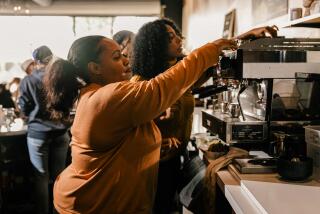Carl Diedrich; Coffee Sales Pioneer
- Share via
Carl Diedrich, a German-born vagabond whose modest coffee-roasting business gave rise to the international Diedrich Coffee chain, died at his Costa Mesa home recently of complications from Parkinson’s disease. He was 86.
As patriarch of the family business, Diedrich oversaw the birth of a chain of more than 370 of the signature red-and-gold coffeehouses in 37 states and 11 other countries--a distant second behind the now-ubiquitous 3,300 Starbucks outlets.
Yet in a career that moved from mechanical engineering to running a tropical plantation, Diedrich’s life fell far outside the usual career path to the corporate boardroom.
There was no MBA from an elite business school, no period of tutelage with an established CEO. Instead, Diedrich’s move into the retail coffee business began with a jury-rigged roaster in a Costa Mesa garage, a variation on the old adage that building a better mousetrap will bring the world to your door.
Diedrich simply roasted a better coffee bean, drawing customers with the kind of aroma that rarely comes from a can.
“He’s been what I would call a bridge back to the origins” of the specialty coffee industry, said Ted Lingle, executive director of the Specialty Coffee Assn. of America, based in Long Beach. “In the beginning, they were the very model of what a specialty coffee store should be--high quality standards, a lively offering of [source] countries, and a knowledgeable and skilled staff.”
Over the last three years, long after Diedrich passed the coffee cup to son Martin Diedrich, the Irvine-based company has struggled because of what analysts described as overly ambitious expansion plans.
Many of the problems stem from the company’s 1998 purchase of a larger competitor, Coffee People Inc., in the corporate equivalent of a minnow swallowing a trout. The firm has since struggled to fit new mall outlets into a business geared more toward stand-alone restaurants and franchises.
Earlier this year, the firm’s stock was nearly dropped from the Nasdaq exchange after it fell below $1 a share, though it has since rebounded to $3.40, well below its 52-week high of $7.87 a share.
But those struggles pale against the backdrop of a life that endured war and the loss of the Diedrich family land in Germany, a career that included helping build roads for Ford Motor Co. in the Balkans before World War II, and, after the war, building an auto plant in Jedda, Saudi Arabia, teaching engineering at colleges in Egypt and Spain, and then eking out a living planting trees in rainy Vancouver.
“We had a wild and adventurous upbringing,” said Michael Diedrich, one of five sons and chief coffee officer of Diedrich Coffee. “He was a very unconventional father, truly an individualist. He comes from a day and age when one could still be that way.”
The Diedrich family’s coffee roots run deep. In 1916, Diedrich’s mother inherited a Costa Rican coffee plantation from a distant uncle and visited often until the family lost it during World War II.
At the time, Diedrich was a conscript in the German army. With his engineering background, he was assigned to an artillery unit as a spotter, selecting targets and determining settings for the weapons. He was captured once by the Russians, his son said, but managed to escape from a Siberia-bound transport train.
He survived the Battle of the Bulge and at the end of the war was among the troops trying to protect his hometown of Berlin from its inevitable collapse under Allied pressure.
Disillusioned with Germany and stripped of the family’s ancestral lands, Diedrich rejoined Ford and was assigned to a series of jobs in the Middle East, including building an auto plant for the royal family of Saudi Arabia, Michael Diedrich said.
But he also studied coffee, learning roasting techniques in Naples, Italy, and absorbing the ambience of coffeehouses across the Middle East. Family legend has it that he traced coffee to its source in the Yemeni highlands at the southern tip of the Arabian Peninsula, spending time with local growers.
Diedrich returned to Germany in the early 1950s, married Inga Zeitz, whose family ran a coffee, tea and cocoa business, and hit the road again, ending up in North America. There, Diedrich worked a series of jobs--ranging from marine biology in Vancouver to construction foreman in Los Angeles--before moving to Central America.
In 1966, he and fellow investors bought a 45-acre plantation in Guatemala. About five years later, Diedrich lit out again, deciding finally to live in the United States.
His plan was to open a business importing coffee beans from his plantation and those of other Central American growers. A chance stop at a Corona del Mar gas station convinced him that the Newport Beach area would be perfect, and the first tentative roots were put down, the son said.
Diedrich opened shop in a rented Costa Mesa garage before moving the operation to a strip mall, selling fresh-roasted coffee by the pound. In 1983, Martin Diedrich joined the business. About the same time, his brothers Steve and Carl Jr. began refining Diedrich’s designs for a commercial coffee roaster and set up production in Idaho.
Working separately but complementing each other, the sons became key players in the growth of the specialty coffee industry, combining their father’s passion for the coffee with a vision of businesses that would become de facto neighborhood gathering spots.
“The whole Diedrich story is fascinating,” Lingle said, adding that Diedrich believed in trying to improve the lives of the coffee growers themselves.
Diedrich stepped back from the business in about 1985, after its focus expanded from roasting to retailing.
Diedrich, who died July 31, is survived by his wife, Inga, of Costa Mesa, and his five sons. A memorial service is being planned for later this month.
More to Read
Inside the business of entertainment
The Wide Shot brings you news, analysis and insights on everything from streaming wars to production — and what it all means for the future.
You may occasionally receive promotional content from the Los Angeles Times.











